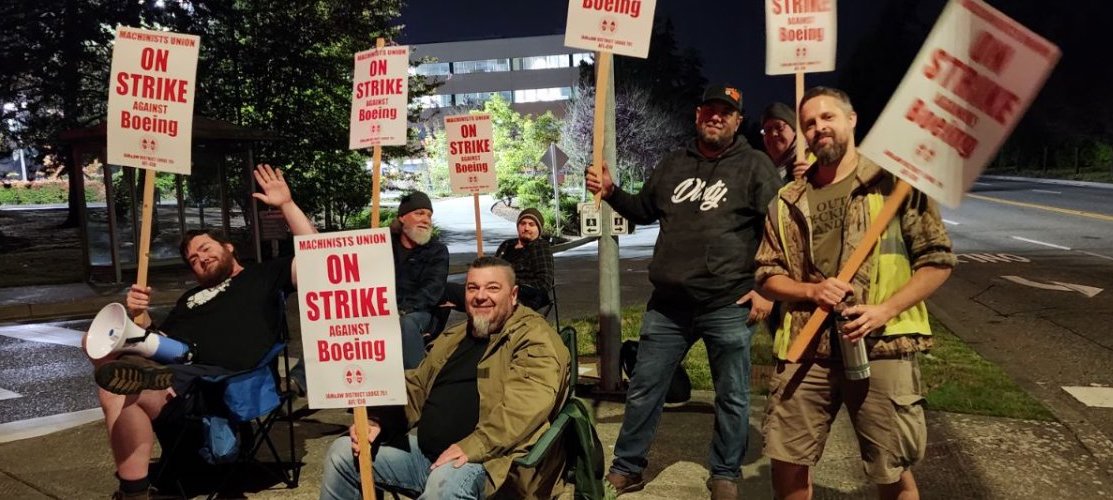
Boeing machinists rejected a contract offer on Wednesday that would have ended a six-week strike, claiming the deal was not generous enough. Days after reporting chilling financials exacerbated by an idle production line, what’s next for the beleaguered aerospace giant?
No End In Sight For Boeing Strike After Machinists Overwhelmingly Vote Down Contract Offer
64% of Boeing machinists voted against the contract proposal, down from the 96% that voted to strike on September 13, 2024. Since that time, these workers have gone without pay or health insurance. Meanwhile, Boeing’s production lines have stalled, creating an even longer backlog. The deal on the table included:
- 35% pay increase over four years
- enhanced health and retirement benefits
- $7,000 signing bonus
As a result of voting down the contract, about 33,000 union employees will remain sidelined from Boeing’s factories in Everett, Renton, and in other locales.
Jon Holden, Machinists District 751 President, offered a muted reaction to the vote:
“Today’s vote is a culmination filled with many emotions. We have made tremendous gains in this agreement in many of the areas our members said were important to them. However, we have not achieved enough to meet our members demands today. We remain on strike.”
Boeing and the IAM union will go back to the negotiating board, with Holden saying he would seek a 40% wage increase as well as additional vacation time and sick leave.
Meanwhile, Boeing just reported a $6.2 billion Q3 loss and announced plans to reduce its workforce by 17,000 employees.
While Boeing has not yet commented concerning the IAM’s contract rejection, CEO Kelly Ortberg has vowed to “reset” labor relations once a new deal is reached.
“When they’re back on the floor, I’ll be back on the floor helping improve that relationship.”
Boeing may be too big to fail and even too big (and with too many assets including hundreds of unfilled orders) to declare bankruptcy, but as production lines continue to sit idle, confidence in the stored American planemaker continues to decline.
image: @MachinistsUnion / X




Boeing’s shareholders gave Dave Calhoun a $22 million pay package in 2022, and $35 Million in 2023. Plus he gets $45 million in stock and options for his retirement.
Since they seem to have lots of money to throw around on a CEO who ran the company into the ground, then surely they have more to pay their actual workers.
Take that $102 million divided by 33,000 mechanics and you get a one time amount of about $3,091. Divide by the number of employees, and you get less than $300 per employee each year for two years. Is the Calhoun compensation “fair”? Probably not. But, when you’re offering less than 20% your employees $231 million as a signing bonus, it seems more trivial. But, when we’re talking about a firm with $78 billion in 2023 revenue, the problem is the quality of leadership, not their pay. Trust me, BA shareholders would have gladly paid twice $102 million for better leadership. Yes, “we” compensate mediocre execs too much. But, it’s quality of leadership, not their pay. Plus, “we” create incentives that encourage short-term stock price over long-term gains.
Boeing shareholders have taken it in the rear more than…….you know who.
Probably time to sell the stock and take the losses to offset other gains, just don’t see it turning around anytime soon.
You really can’t help yourself, can you? Lol.
Come on Aaron, everyone knows he’s right.
Neither can you, it seems.
Shareholders didn’t give any CEO or management any pay package. Unfortunately, the way voting works is that fund managers for index funds vote instead of the shareholders of the index funds. Often fund managers are rubber stamps for the status quo. It’s the shareholders who are robbed by management and employees. Management walks away with huge pay packages and employees take zero risk and earn much more than they can anywhere else and extort via unions.
I will say that a 35% raise over four years is rather generous compared to other industries as the average for Americans over four years is 3% per year. What people also have to realize is that when you increase wages, it means there is a cut in the workforce by the company.
However, asking for additional vacation and sick time is reasonable as the average is about 20 days and this is not reasonable, especially for those with families and I think this is what the union wants to push for if I read the few news articles around it correctly. I may be wrong though as I am rather jet lagged at the moment.
What I didn’t write about it is that the biggest sticking points seems to be that workers wanted a defined benefit pension plan to return versus a 401(K) type option. Who gets that any longer? I mean, I want one too…but I’m not going to strike over it.
Several companies in the O & G industry still have a defined pension benefit . XOM is an example.
1.6% x years of pension service x final average pensionable pay (typically the monthly average of your last 39 months of pay)
minus
your Social Security offset
DB pension plans exist in the public sector. However, many smart states have closed them to new enrollees, who are forced into DC. Some states still have them active, with a few, like Illinois, stuck in pushing the pain of their Ponzi scheme (since they’ve spent previous contribution rather than invest it) to future taxpayers.
I know of no case where a firm without a DB plan has added one (or reinstated) in decades. Anyone know of such a case? The US should not allow new DB plans and no new enrollees in DB, without a commitment that we will not come to their rescue. Since we don’t live up to such commitments, they should not allow new plans/enrollees.
Some older institutions such as universities offer it to their employees but it is antiquated. I’m equally surprised.
Wondering what is the salary of those worker.
Well over $100K/year.
Move as much production to South Carolina as possible and then begin right sizing Seattle. $6 billion loss in one quarter, $1 million per day and these guys turn down a 35% pay increase? Get real.
It’s time for Boeing to move all of its production out of the Pacific NW.
Texas has a lot of land. A Boeing declaration of Bankruptcy, coupled with ridiculous pension reinstatement, would throw the Seattle area into an economic calamity.